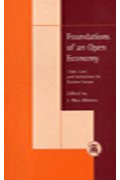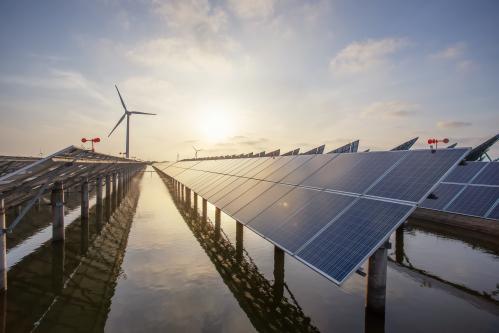This post has been updated, in February 2017, to include more recent analysis and commentary from Brookings experts on the carbon tax. See new entries marked *.
A “carbon tax” is one way to price carbon emissions generated from the burning of fossil fuels—e.g., coal and natural gas—to generate energy.
Economist call these emissions “negative externalities” because their costs—especially in terms of environmental harm—are not borne solely by the producer, but by the community. Thus, the actual cost to society of producing energy is higher than the cost to individuals.
Putting a price on carbon is one policy to address this imbalance, and a carbon tax is one way to do so. In a policy paper for The Hamilton Project, Senior Fellow Adele Morris sums up the basic argument for a carbon tax, writing that:
The United States confronts serious policy challenges from an unsustainable budget deficit, a tax and regulatory system that most experts agree is inefficient, and the long-term threat from climate disruption. A carbon tax offers a policy that can help address all three challenges by combating climate change, curbing the rising debt level, and helping achieve efficient reforms to current policies.
Cap-and-trade is another method that features a cap set on emissions in a target area, and the cap creates a carbon “market” in which emitters can buy and sell emission permits. Ireland, Sweden, and Chile all have some form of a carbon tax, but the U.S. does not, although legislation to implement a cap-and-trade system failed to pass Congress in 2009 (the “Waxman-Markey” bill).
Brookings scholars like Morris and others have long researched carbon pricing, and specifically the carbon tax. Here are some of their chief findings.
1. A carbon tax can improve the U.S. fiscal situation while reducing emissions
In 2014, Morris estimated that a $16/ton of CO2 that rose at 4 percent over inflation per year “would raise more than $1.1 trillion in the first 10 years and more than $2.7 trillion over a 20-year period.” She added that including a carbon tax in fiscal reform “could ameliorate the potential regressivity of a carbon tax” (lower income people spend a larger share of their income on energy) by directing some portion of the annual revenues to certain lower-income households. And, revenues from a carbon tax could be used to reduce other taxes.
2. A carbon tax can help those most affected as society transitions to clean energy, including coal workers
U.S. coal production is falling, leading to job losses and economic decline in coal communities, especially in Appalachia. In a new paper, Morris argues that “If designed intelligently, the most cost effective climate policy approach—taxing or otherwise putting a price on carbon—could help fund the transition in coal communities.”
The idea that a carbon tax can help coal country is counterintuitive. Coal producers and coal communities are very much opposed to it because it would drive coal consumption down further. But Morris shows that “a carbon tax doesn’t need to be all bad news for the coal community.” Many factors are behind the decline in coal production and consumption, she says, and a carbon tax “is uniquely suited to provide” funding to help these communities transition and at the same time generate “superior environmental and macroeconomic outcomes.”
* 3. A carbon tax could negatively effect low income households, but there are policies to mitigate the cost
Adele Morris and AEI Resident Scholar Aparna Mathur are authors of a new paper, “A U.S. carbon tax and the Earned Income Tax Credit: An analysis of potential linkagese,” in which they examine how a carbon tax would effect EITC benefits and ways to mitigate any negative effect. They find that “the revenue from the carbon tax could be enough to expand the EITC to childless workers and hold other low income households harmless, combining a regressive tax with progressive benefits.”
4. A carbon tax can drive innovation in green technology, but has trade implications
Since 2008 and continuing into the Obama administration, a central part of the U.S. economic strategy, and an important environmental goal, has been to develop green. Senior Fellow Joshua Meltzer argues that “[f]ocusing on developing technologies to address climate change plays to the United States’ strengths in innovating, developing, and commercializing new technologies.” Writing that there are “good policy reasons for preferring a carbon tax over a cap and trade system,” Meltzer shows that a carbon tax is “an important incentive for companies to innovate and develop new green technologies that reduce their CO2 emissions and their costs of complying with the tax.” However, Meltzer also lays out remedies for the international trade issues that will arise from the U.S. pricing carbon, such as carbon leakage and competitiveness.
5. A carbon tax could be the best way for states to meet Clean Power Plan targets
“For many states, a carbon tax could be the most easily administrable and cost-effective compliance approach” to meet the EPA’s emissions limits by 2030, writes Morris, “and they should start taking the idea seriously.” Morris notes that British Columbia is the first North American government to implement a carbon tax, and it has reduced its emissions “7.1 times faster than analysts expected, in part because the transparent and predictable price signal allowed business and consumers to invest efficiently and with foresight.”
* Morris, David Bookbinder, and Yoram Bauman are authors of a paper on why U.S. states “are increasingly motivated to design a carbon tax” despite the stay on implementation of the CPP rule by the Supreme Court. They look at policy design for a carbon tax given states’ different conditions and resources.
6. Low oil prices are an opening for a variable carbon tax
Kemal Derviş, vice president and director of Global Economy and Development at Brookings, and Research Associate Karim Foda argue that with a variable carbon tax—one that fluctuates asymmetrically with the price of oil—“policymakers could use the market to help propel their economies away from dependence on fossil fuels, redistributing producer surplus (profits) from oil producers to the treasuries of importing countries, without placing too large or sudden a burden on consumers.” Further, they argue that “the key to this strategy’s political feasibility is to launch it while [oil] prices are very low.”
7. There’s a conservative and a liberal case for a carbon tax
Senior Fellow William Gale, acknowledging the well-known liberal case for a carbon tax, explains the conservative case as well:
focusing on the role of public policy to provide insurance against adverse outcomes, to get market incentives right, and to obviate more costly approaches, such as regulations, subsidies, and mandates. The carbon tax could supplant at least some regulation of greenhouse gases under the Clean Air Act, which the EPA has begun to implement and which most conservatives oppose.
Gale adds that “[s]ome of the revenues from a carbon tax could be used to reduce corporate taxes, a proposal that may help garner conservative support.” Looking ahead to a new presidential administration in 2017, Gale argues that “the new president should seize the opportunity to lead the country to a carbon tax.”
8. A carbon tax is a “commitment device” for tackling climate change
Senior Fellow Richard Reeves writes that “climate change policy is an obvious example of a policy area requiring long-term decisions but vulnerable to short-term political pressures.” In a recent paper on the uses of policy commitment devices that “insulate” some areas of policy from political pressure (e.g., the Federal Reserve Bank, the Base Realignment and Closure Commission), he argues that a carbon tax “could provide a powerful commitment device for the policy goal of reducing carbon emissions.” Such a tax could also, he points out, be used to reduce income taxes.
9. A carbon tax has a (slightly) better economic outcome than a tradable performance standard
The EPA’s Clean Power Plan favors a national tradeable performance standard (TPS, not to be confused with cap-and-trade) as the method for states to meet economy-wide emissions reductions by 2030. Brookings scholars Warwick McKibbin, Adele Morris, and Peter Wilcoxen compared the TPS approach to a carbon tax and found the latter to “be even more efficient than a TPS.”
Not only does it create an incentive for utilities to switch fuels in exact proportion to the carbon content of each fuel, it also creates retail price signals that encourage end users to reduce demand. On the other hand, a TPS or CES [Clean Energy Standard] may not raise retail electricity prices as much as a carbon tax, and therefore may be more attractive on political, distributional, and competitiveness grounds.
10. Most economists favor a carbon tax
“As one of the few taxes favored by economists,” Gale writes, “carbon taxes could help the nation address several issues simultaneously.” He goes on to explain the benefits of a carbon tax and also the policies that can offset the negatives. Morris notes the “remarkable consensus of economists,” that “a price on carbon would minimize the cost of steering economic activity away from the greenhouse gas emissions that threaten the climate.” She emphasizes that despite some disagreements on the details of a carbon tax policy, “there’s as close to a universal consensus among economists as there is on any topic that pricing carbon should be a central feature of climate policy worldwide.”
—
See also:
“Implementing a US Carbon Tax: Challenges and Debates,” edited by Ian Parry, Adele Morris, and Roberton Williams
“How to use carbon tax revenues,” by Donald Marron and Adele Morris
* “Tax carbon, California–the rest of the nation will thank you,” by Adele Morris, Jerry Taylor, and Michael Wara
* “Growth, carbon, and Trump: State progress and drift on economic growth and emissions ‘decoupling’,” by Devashree Saha and Mark Muro
* “Carbon taxes: An opportunity for Bangladesh?,” by Qimiao Fan, Simon Davies, and Zahid Hussain






Commentary
10 things you should know about the carbon tax
May 4, 2016